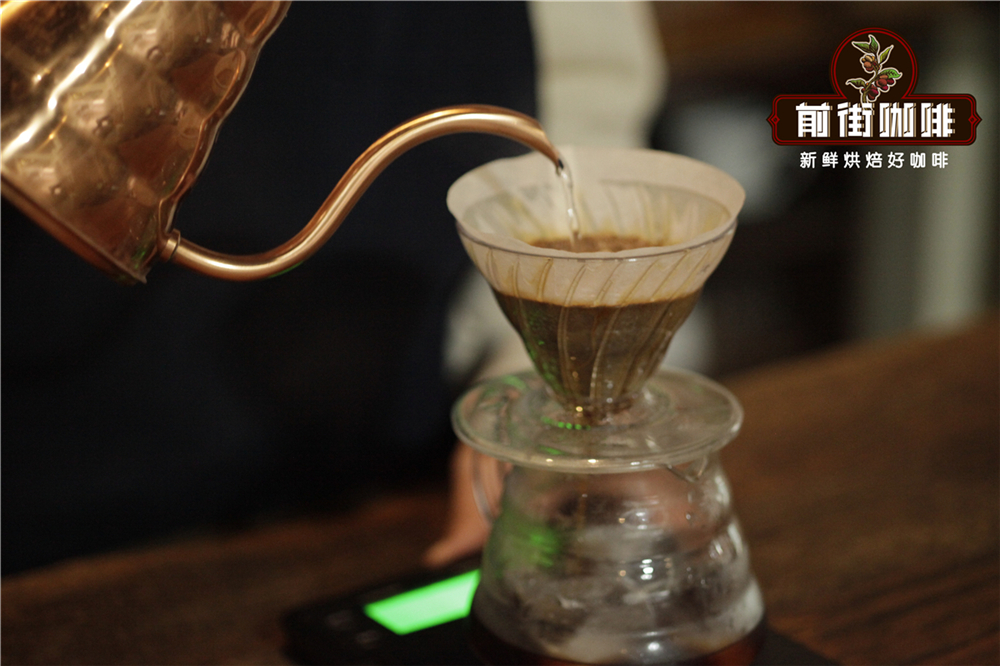The extraction ability of hand-brewed coffee? What's so particular about the punching method? What is the principle of hand extraction?

Professional coffee knowledge exchange more coffee bean information please follow the coffee workshop (Wechat official account cafe_style)
The extraction ability of hand-brewed coffee? What's so particular about the punching method? What is the principle of hand extraction?
The tongue is our data source, first take a sip of coffee, an entrance brings obvious strong coffee flavor, rich and solid taste followed, the difference is the full back sweet end rhyme, compared with the Sanyo filter cup is even more complete, the overall flavor presentation is more complete, the details of the different results are different, the small local correction so that the differences are completely presented. Small places with high achievements through hard work also need to be praised by us.
The opening of the filter cup is widely connected to the narrow bottom, indicating a relatively concentrated powder layer. Although it is a table-shaped filter cup, it can greatly increase the particle draught ratio. From the beginning of the first water supply, the overall volume of coffee particles in contact with hot water is much wider than the first two table-shaped filter cups. Although the distance between the ribs is not as wide as the Sanyo filter cup, the water level drops slightly more slowly. However, the high proportion of overall draught can be used to increase the advantage at this time, and more particles can be released in an instant. Then the concentrated bottom design, coupled with a very important little ingenuity, ── 's concave bottom design concept, makes the extraction of coffee substances faster when the water level falls, making the defects caused by the small distance between the ribs seem negligible; the strong entrance flavor, which requires a fast flow rate, is also shown by this unexpected small detail. And because the overall water level drops a little slower than the Sanyo filter cup, the combination time of water and coffee substances is prolonged, so that the overall taste is more lasting than the Sanyo filter cup, and the strength is the same as that of the Sanyo filter cup, so that the coffee flavor presented by the Melitta SF1x1 filter cup is balanced, strong enough, persistent and long, and truncation shortens the advantages and disadvantages of the above three filter cups.
Let's go back to the time point of saturation. Why is the time point of saturation of different filter cup particles so close? In fact, the message to be revealed here is also a message that many people may overlook: in addition to meeting the three major points we expect, it also represents the correct way to saturate particles and accelerate particle saturation. it is not strongly related to the amount of coffee released by particles, which can also explain why the time of saturation is similar, but the taste and taste is completely different.
If you set out the above paragraph, it will be more clear:
(1) the technique of water supply helps to saturate the particles.
(2) the structural design of the filter cup helps the particles to release coffee substances.
Taking the four tested filter cups as an example, we first judge the timing of saturation in a simple way. What kind of state can we judge that the particles have been saturated? I still remember that we said that the water absorption of particles would become heavier, and the sinking speed of heavier particles would become faster. when cooking in the first stage, the amount of water supply was not much, and the proportion of nearly saturated particles was already greater than that of water. the condition of water absorption of particles is not as good as that of the initial stage, and the natural water level will rise very fast. when the water level rises rapidly, it shows that the particles have been saturated to the need to switch to the way of water supply.
So far, I believe you should have a basic concept: different filter cups will correspond to different falling rates of water level. since this is the case, there should be a considerable gap at the time of saturation, but the result is that the time of saturation of the four filter cups is close to that of drastic changes. on the contrary, it begins only after saturation, although the taste of coffee liquid extracted before saturation will be different. It will still show the characteristics of the filter cup, but the function released by the particles will not cross until the particles are saturated. Saturated particles do not mean stopping the release of coffee substances. assuming that the release has stopped at this time, then there is no need for a set amount of extraction, and hot water can be injected directly into the target amount, but the appearance of the two is completely different. At this time, the value of the filter cup will be fully revealed at this point in time, with a good decline rate or good extraction ability, and a filter cup that can provide enough time for coffee particles to combine with water. The more it can show the nature and flavor of coffee beans.
To rearrange it, the presentation of hand-brewed coffee is:
(1) the first formula: water injection, the meaning is the integrity of the overall coffee particle concentration, the strength of the flavor is determined here.
(2) the second formula: laying water means the release of coffee particles on the surface.
(3) the third trick: to flood, adjust the concentration, taste stacking and continuous monitoring is based on this stage as the watershed.
A key point has been revealed above. Finally, I will help you sort out the characteristics of the four filter cups that have been analyzed. There is a chart on the next page that can clearly distinguish the advantages and disadvantages of each filter cup.
Why did you choose these four filter cups?
The reason is very simple. Apart from the fact that they are all classic and representative filter cups, easy to buy and high exposure are also the key to selection, so that interested people can obtain these filter cups without difficulty. Users who already have filter cups but do not know much about the functions of filter cups can also try to take a look at the testing methods of the training center, and the results are compared with the previous hand-punching methods. Whether we can make a new spark and get a different result from the original.
The vertical axis represents the intensity of the taste of the imported coffee, while the horizontal axis represents the persistence of the taste and taste, representing the area felt by the tongue, from left to right, from the tip of the tongue to the root of the tongue. The characteristics represented by the four filter cups can be seen more clearly from the chart.
The performance is the most balanced, both the extension of the taste and the intensity of the entrance are very good.
On the other hand, the entrance is strong, the stamina is weak, and the taste can not last long.
You can't get any bargains, and the performance in all aspects is not outstanding.
The proper presentation of Sanyo filter cup is also a good choice. Green vegetables and radishes have their own preferences. An objective analysis of the function of the filter cup and its appearance is one of the ideas of the training center. No further comments or suggestions are made, but the purpose is to sum up the function of each filter cup. The key point is to allow users to measure their budget and taste preferences to choose the filter cup.
Important Notice :
前街咖啡 FrontStreet Coffee has moved to new addredd:
FrontStreet Coffee Address: 315,Donghua East Road,GuangZhou
Tel:020 38364473
- Prev

Time and ratio of three-stage extraction of hand-brewed coffee how to adjust the flavor of hand-brewed coffee
Professional coffee knowledge exchange more coffee bean information please follow the coffee workshop (Wechat official account cafe_style) what is the taste of three stages of hand-brewed coffee? How to extract three stages? If we want to extract all the substances from the coffee, the best way is to grind the coffee powder to the finest, and then directly boil the water for him to keep boiling (in fact, Turkish coffee is
- Next

A common mistake in making coffee by hand? How to make a cup of coffee? What do you need to pay attention to?
Professional coffee knowledge exchange more coffee bean information please follow the coffee workshop (Wechat official account cafe_style) hand coffee common mistakes? How to make a cup of coffee? What do you need to pay attention to? Hand coffee 1 coffee bean error 1: a bean grinder with good grinding degree can ensure that the coffee powder is evenly ground. If the coffee powder is uneven and there are too many fine powders, the product will be released.
Related
- Detailed explanation of Jadeite planting Land in Panamanian Jadeite Manor introduction to the grading system of Jadeite competitive bidding, Red bid, Green bid and Rose Summer
- Story of Coffee planting in Brenka region of Costa Rica Stonehenge Manor anaerobic heavy honey treatment of flavor mouth
- What's on the barrel of Blue Mountain Coffee beans?
- Can American coffee also pull flowers? How to use hot American style to pull out a good-looking pattern?
- Can you make a cold extract with coffee beans? What is the right proportion for cold-extracted coffee formula?
- Indonesian PWN Gold Mandrine Coffee Origin Features Flavor How to Chong? Mandolin coffee is American.
- A brief introduction to the flavor characteristics of Brazilian yellow bourbon coffee beans
- What is the effect of different water quality on the flavor of cold-extracted coffee? What kind of water is best for brewing coffee?
- Why do you think of Rose Summer whenever you mention Panamanian coffee?
- Introduction to the characteristics of authentic blue mountain coffee bean producing areas? What is the CIB Coffee Authority in Jamaica?

